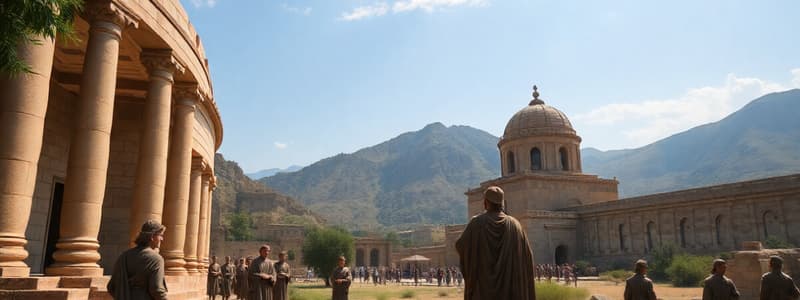Podcast
Questions and Answers
What characterizes the Middle Ages in terms of societal structure?
What characterizes the Middle Ages in terms of societal structure?
- Feudalism and the spread of Christianity. (correct)
- Establishment of democratic governance and city-states.
- Cultural revival based solely on classical works.
- Emergence of scientific thought and exploration.
Which of the following events marks the beginning of Ancient History?
Which of the following events marks the beginning of Ancient History?
- Beginning of agriculture.
- First use of currency.
- Advent of writing (~3000 BCE). (correct)
- Invention of the wheel.
What major transition defines the Renaissance period?
What major transition defines the Renaissance period?
- A shift towards romanticism and modernism.
- A revival of art, culture, and learning from classical sources. (correct)
- The initiation of the Industrial Revolution.
- The fall of the Western Roman Empire.
Which of the following concepts is central to Karl Marx's interpretation of history?
Which of the following concepts is central to Karl Marx's interpretation of history?
What is the main focus of environmental history?
What is the main focus of environmental history?
Which civilization is not considered part of Ancient History?
Which civilization is not considered part of Ancient History?
What is a primary source in historical research?
What is a primary source in historical research?
What period is noted for the rise of nation-states and colonialism?
What period is noted for the rise of nation-states and colonialism?
Flashcards are hidden until you start studying
Study Notes
Overview of History
- Definition: History is the study of past events, particularly in human affairs.
- Importance: Understanding history helps to comprehend contemporary society and informs future decisions.
Major Periods in History
-
Prehistoric Era
- Time before written records.
- Studied through archaeology and anthropology.
-
Ancient History
- Begins with the advent of writing (~3000 BCE).
- Key civilizations: Mesopotamia, Ancient Egypt, Indus Valley, Ancient China, and Mesoamerica.
-
Classical Antiquity
- Notable for the rise of empires and cultures (e.g., Greece and Rome).
- Development of philosophy, democracy, and the arts.
-
Middle Ages (Medieval Period)
- Characterized by feudalism, the spread of Christianity, and the rise of Islam.
- The fall of the Western Roman Empire (476 CE) marks the beginning.
-
Renaissance
- A revival of art, culture, and learning based on classical sources (14th to 17th century).
- Key figures include Leonardo da Vinci and Michelangelo.
-
Early Modern Period
- Marked by the Age of Exploration, the Reformation, and the Scientific Revolution (16th to 18th century).
- Rise of nation-states and colonialism.
-
Modern History
- Involves major events like the Industrial Revolution, World Wars, and the Cold War (19th to 20th century).
- Focus on globalization and technological advancements.
Key Themes in History
- Political History: Study of governance, power, and statecraft.
- Social History: Focus on the lives of ordinary people, culture, and social structures.
- Economic History: Examination of economic systems, trade, and industry.
- Cultural History: Exploration of art, religion, and intellectual movements.
- Environmental History: Interaction between humans and the environment over time.
Historical Methods
- Primary Sources: Original documents, artifacts, or other first-hand evidence.
- Secondary Sources: Analyses or interpretations based on primary sources.
- Historiography: Study of how history is written and the different perspectives that influence historical narratives.
Notable Historians
- Herodotus: Often called the "Father of History" for his work on the Greco-Persian Wars.
- Thucydides: Known for his account of the Peloponnesian War, emphasizing factual accuracy.
- Karl Marx: His historical materialism approach analyzes history through class struggles.
Impact of History
- Lessons Learned: Provides insights into human behavior and societal changes.
- Identity and Memory: Shapes national identities and collective memories.
- Conflict and Resolution: Understanding historical conflicts can inform peace-building efforts.
Modern Historical Trends
- Emphasis on inclusivity: Focus on marginalized groups and underrepresented narratives.
- Rise of digital history: Use of technology for research, preservation, and public engagement.
- Interdisciplinary approaches: Combining history with other fields like sociology, anthropology, and political science.
Overview of History
- History studies past events, particularly those involving human affairs.
- Understanding history aids in comprehending contemporary society and informs future decisions.
Major Periods in History
- Prehistoric Era: Prior to written records; investigated via archaeology and anthropology.
- Ancient History: Commences around 3000 BCE with the start of writing; features civilizations like Mesopotamia and Ancient Egypt.
- Classical Antiquity: Characterized by the rise of powerful empires, cultural development, philosophy, and democracy, notably Greece and Rome.
- Middle Ages: Defined by feudalism, the spread of Christianity, and Islamic expansion; begins with the fall of the Western Roman Empire in 476 CE.
- Renaissance: A resurgence of art and culture from the 14th to 17th centuries, inspired by classical sources; prominent figures include Leonardo da Vinci and Michelangelo.
- Early Modern Period: Highlights include the Age of Exploration, the Protestant Reformation, and the Scientific Revolution, alongside the emergence of nation-states and colonialism.
- Modern History: Encompasses the Industrial Revolution, World Wars, and the Cold War, with a focus on globalization and technological advances.
Key Themes in History
- Political History: Involves governance, power dynamics, and statecraft.
- Social History: Explores the lives, cultures, and social structures of ordinary people.
- Economic History: Analyzes economic systems, trade, and industry development.
- Cultural History: Investigates art, religion, and intellectual movements throughout time.
- Environmental History: Studies human interaction with the environment across different eras.
Historical Methods
- Primary Sources: Original documents or artifacts that provide first-hand evidence.
- Secondary Sources: Interpretations or analyses derived from primary sources.
- Historiography: Examines how history is written and the various perspectives that shape historical narratives.
Notable Historians
- Herodotus: Known as the "Father of History" for documenting the Greco-Persian Wars.
- Thucydides: Renowned for his factual account of the Peloponnesian War, stressing accuracy.
- Karl Marx: Introduced historical materialism, analyzing history through the lens of class struggles.
Impact of History
- Offers lessons about human behavior and societal evolution.
- Shapes national identities and contributes to collective memory.
- Understanding historical conflicts aids in conflict resolution and peace-building efforts.
Modern Historical Trends
- Focus on inclusivity, highlighting stories of marginalized and underrepresented groups.
- Growth of digital history allows for enhanced research, preservation, and public involvement.
- Interdisciplinary approaches integrate history with sociology, anthropology, and political science.
Studying That Suits You
Use AI to generate personalized quizzes and flashcards to suit your learning preferences.


